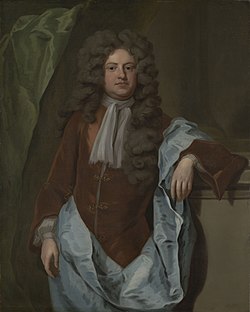Charles Montagu, 1st Earl of Halifax
|
The Right Honourable The Earl of Halifax KG PC PRS |
|
|---|---|
 |
|
| First Lord of the Treasury | |
|
In office 13 October 1714 – 19 May 1715 |
|
| Monarch | George I |
| Preceded by |
The Duke of Shrewsbury as Lord High Treasurer |
| Succeeded by | The Earl of Carlisle |
|
In office 1 May 1697 – 15 November 1699 |
|
| Monarch | William III |
| Preceded by | The Earl of Godolphin |
| Succeeded by | The Earl of Tankerville |
| Chancellor of the Exchequer | |
|
In office 3 May 1694 – 15 November 1699 |
|
| Monarch | William III and Mary II |
| Preceded by | Richard Hampden |
| Succeeded by | John Smith |
| Commissioner of the Treasury | |
|
In office 21 March 1692 – 3 May 1694 |
|
| Monarch | William III and Mary II |
| Preceded by | Thomas Pelham |
| Succeeded by | John Smith and William Trumbull |
| Personal details | |
| Born | 16 April 1661 Horton, Northamptonshire Kingdom of England |
| Died | 19 May 1715 (aged 54) |
| Spouse(s) | Countess Dowager of Manchester |
| Relations | fifth son of the 1st Earl of Manchester |
| Profession | poet |
Charles Montagu, 1st Earl of Halifax KG PC PRS (16 April 1661 – 19 May 1715) was an English poet and statesman.
Charles Montagu was born in Horton, Northamptonshire, the son of George Montagu, fifth son of 1st Earl of Manchester. He was educated first in the country, and then at Westminster, where he was chosen as a Queen's Scholar in 1677, and entered into close friendship with George Stepney.
Montagu was admitted to Trinity College, Cambridge in 1679, graduated MA in 1682, and became a Fellow of Trinity in 1683. Two portraits of Montagu by Godfrey Kneller are in the college collection.
His relation, Dr. John Montagu, was then Master of Trinity College, and took him under his wing. At Cambridge he began a lasting association with Isaac Newton.
In 1685, Montagu's verses on the death of King Charles II made such an impression on the Earl of Dorset that he was invited to town and introduced to other entertainments. In 1687, Montagu joined with Matthew Prior in "The City Mouse and the Country Mouse," a burlesque of John Dryden's The Hind and the Panther. He sat in the Convention Parliament of 1689. At about the same time he married the Countess Dowager of Manchester, and intended taking Holy Orders, but changed his mind and purchased for £1,500 a position as Clerk of the Council.
...
Wikipedia
